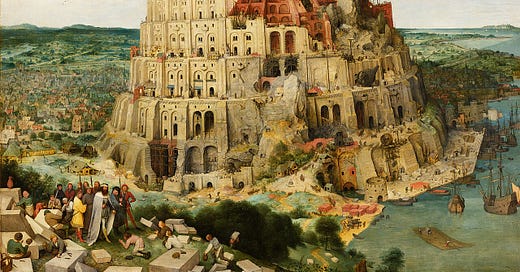When God knocks over our proud little human houses-of-cards, He causes the diaspora to take on beautiful shapes.
Today, I am thinking about the Tower of Babel (Genesis 11), and the God’s curse of the Confounding of Languages. It seems like a curse, but it plays out as a blessing. I think that (treading carefully here) God’s interaction with His creation (even in cursing) is likely to produce beautiful results.
Today, I give thanks for the rich tapestry of human language. And I give thanks for Babel’s “curse.”
I, for one, am glad we don’t all speak Latin or Esperanto. It would be like everyone driving black, silver, grey, and white cars … oh, wait, that’s what we do now. But it would be so boring compared to the way things are, with our rich variety of languages!
There is a passage in Chesterton’s Orthodoxy which touches on this. I’ll just go ahead and quote GKC’s entire paragraph, BECAUSE IT IS SO GOOD!
This was the big fact about Christian ethics; the discovery of the new balance. Paganism had been like a pillar of marble, upright because proportioned with symmetry. Christianity was like a huge and ragged and romantic rock, which, though it sways on its pedestal at a touch, yet, because its exaggerated excrescences exactly balance each other, is enthroned there for a thousand years. In a Gothic cathedral the columns were all different, but they were all necessary. Every support seemed an accidental and fantastic support; every buttress was a flying buttress. So in Christendom apparent accidents balanced. Becket wore a hair shirt under his gold and crimson, and there is much to be said for the combination; for Becket got the benefit of the hair shirt while the people in the street got the benefit of the crimson and gold. It is at least better than the manner of the modern millionaire, who has the black and the drab outwardly for others, and the gold next his heart. But the balance was not always in one man’s body as in Becket’s; the balance was often distributed over the whole body of Christendom. Because a man prayed and fasted on the Northern snows, flowers could be flung at his festival in the Southern cities; and because fanatics drank water on the sands of Syria, men could still drink cider in the orchards of England. This is what makes Christendom at once so much more perplexing and so much more interesting than the Pagan empire; just as Amiens Cathedral is not better but more interesting than the Parthenon. If any one wants a modern proof of all this, let him consider the curious fact that, under Christianity, Europe (while remaining a unity) has broken up into individual nations. Patriotism is a perfect example of this deliberate balancing of one emphasis against another emphasis. The instinct of the Pagan empire would have said, “You shall all be Roman citizens, and grow alike; let the German grow less slow and reverent; the Frenchmen less experimental and swift.” But the instinct of Christian Europe says, “Let the German remain slow and reverent, that the Frenchman may the more safely be swift and experimental. We will make an equipoise out of these excesses. The absurdity called Germany shall correct the insanity called France.”




